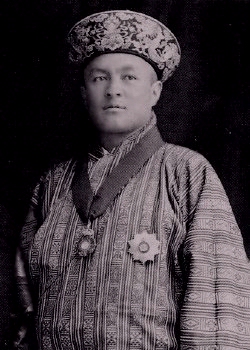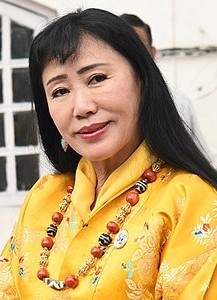Related Research Articles

Bhutan's early history is steeped in mythology and remains obscure. Some of the structures provide evidence that the region has been settled as early as 2000 BC. According to a legend it was ruled by a Cooch-Behar king,Sangaldip,around the 7th century BC,but not much is known prior to the introduction of Tibetan Buddhism in the 9th century,when turmoil in Tibet forced many monks to flee to Bhutan. In the 12th century,the Drukpa Kagyupa school was established and remains the dominant form of Buddhism in Bhutan today. The country's political history is intimately tied to its religious history and relations among the various monastic schools and monasteries.

"Druk Tsenden" is the national anthem of Bhutan. Adopted in 1953,the lyrics were written by Dolop Droep Namgay and possibly translated into English by Dasho Gyaldun Thinley. The accompanying music was composed by Aku Tongmi.

The national emblem of Bhutan maintains several elements of the flag of Bhutan,with slightly different artistry,and contains much Buddhist symbolism.

Jigme Wangchuck was the 2nd Druk Gyalpo or king of Bhutan from 26 August 1926,until his death. He pursued legal and infrastructural reform during his reign. Bhutan continued to maintain almost complete isolation from the outside world during this period;its only foreign relations were with the British Raj in India. He was succeeded by his son,Jigme Dorji Wangchuck.

Jigme Dorji Wangchuck was the 3rd Druk Gyalpo of Bhutan.
DashoLhendup Dorji was a member of the Dorji family of Bhutan. He was also the brother of the Queen of Bhutan,Ashi Kesang choden and uncle to the fourth king of Bhutan,King Jigme Singye Wangchuck. He served as acting Lyonchen following the assassination of his brother,Lyonchen Jigme Palden Dorji,on April 5,1964.

Queen Mother Dorji Wangmo is the Queen Mother of Bhutan,and first wife of former King Jigme Singye Wangchuck,who is married to four sisters all of whom were entitled to be called queen.
The Khengkha language,or Kheng,is an East Bodish language spoken by ~40,000 native speakers worldwide,in the Zhemgang,Trongsa,and Mongar districts of south–central Bhutan.
Dasho Jigme Palden Dorji was a Bhutanese politician and member of the Dorji family. By marriage,he was also a member of the House of Wangchuck.
Kalden "Kelly" Sonam Dorji is a Bhutanese actor,model,and artist who works primarily in Indian movies.
Capital punishment in Bhutan was abolished on March 20,2004 and is prohibited by the 2008 Constitution. The prohibition appears among a number of fundamental rights guaranteed by the Constitution;while some fundamental rights—such as voting,land ownership,and equal pay—extend only to Bhutanese citizens,the prohibition on capital punishment applies to all people within the kingdom.
The Dorji family of Bhutan has been a prominent and powerful political family in the kingdom since the 12th century AD. The family has produced monarchs,Prime Minister of Bhutan,Prime Ministers,Dzong lords and governors. The fourth king of Bhutan Druk Gyalpo,Jigme Singye Wangchuck,as well as his son the current fifth king of Bhutan Jigme Khesar Namgyel Wangchuck,are also members of the Dorji family and therefore also descendants of the royal family of Sikkim. The Dorji family is also the holder of the Bhutan House estate in Kalimpong,India.
Bhutan House is an estate located in Kalimpong,West Bengal,India,owned by the Dorji family of Bhutan. The site is the traditional administrative Dzong for southern Bhutan,and also functioned as the administrative center for the whole of western Bhutan during the modern kingdom's early years of consolidation. It represented the relationship between Bhutan and British India,and is a modern symbol of Bhutan–India relations.
Sir Raja Sonam Topgay Dorji CIE,also called Tobgay,was a member of the Dorji family and Bhutanese politician who served between 1917 and 1952 in the Royal Government under the First and Second Kings of Bhutan. During this period,Topgay Dorji officially held the posts of Gongzim,Deb Zimpon,and Trade Agent to the Government of Bhutan. As such,Topgay Dorji was responsible for fostering Anglo-Bhutanese relations,and later,Bhutan–India relations. Topgay's ties with the west and modernist political factions contributed significantly to the modern political landscape and modernization of Bhutan.

Ugyen Dorji was a member of the elite Dorji family and an influential Bhutanese politician. He served as the closest adviser to Ugyen Wangchuck,the Penlop of Trongsa and later King of Bhutan. Ugyen Dorji was instrumental in fostering friendly relations with the British after the Bhutan War (1864–1865),and providing support to the British expedition to Tibet in 1904. Operating from Bhutan House in Kalimpong,India,Ugyen Dorji used his position to open Bhutan to the outside world,establish Bhutan's foreign relations,and operate a lucrative trading outlet.
Chencho Dorji is a Bhutanese football manager,who most recently,at the senior level,coached Indian club Sudeva Delhi FC in the I-League. Besides Bhutan,he has managed in India.
Pawo Choyning Dorji is a Bhutanese filmmaker and photographer. His feature directorial debut Lunana:A Yak in the Classroom (2019) was nominated for Best International Feature Film at the 94th Academy Awards. He is the youngest recipient of Bhutan’s highest civilian award,the Druk Thuksey,the Heart Son of the Thunder Dragon. It was bestowed to him by King Jigme Khesar Namgyel Wangchuck on the December 17th,2022,the 115th National Day of Bhutan. He is a member of the Academy of Motion Picture Arts and Sciences.
References
- ↑ "Know Your NC Candidate: Pemagatshel".
- ↑ "Hon. Choining Dorji". www.nationalcouncil.bt.